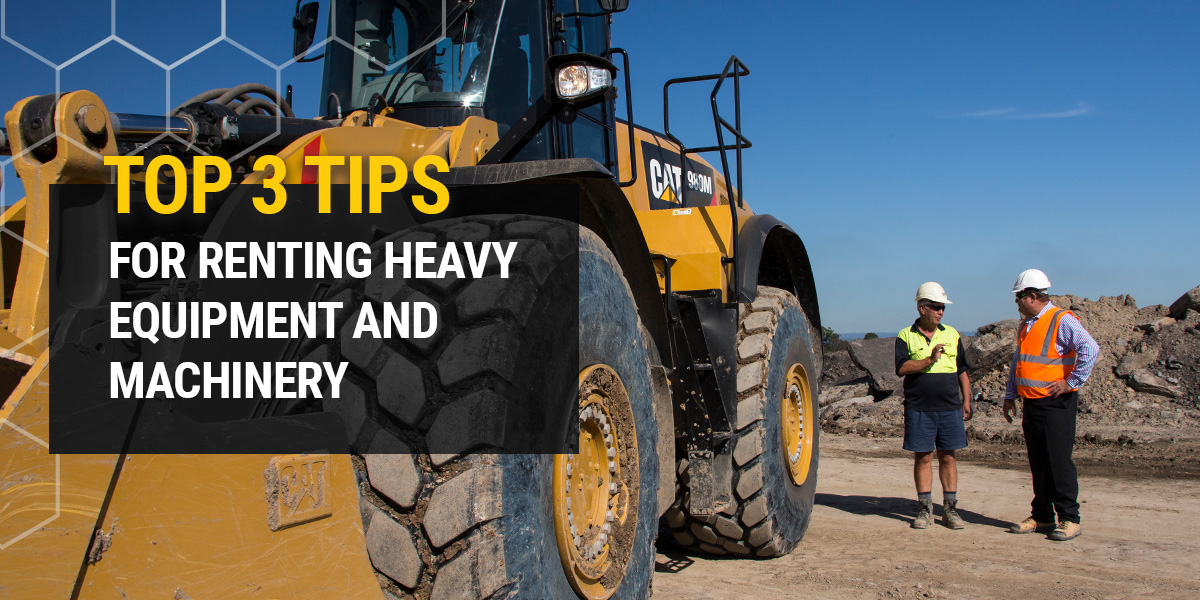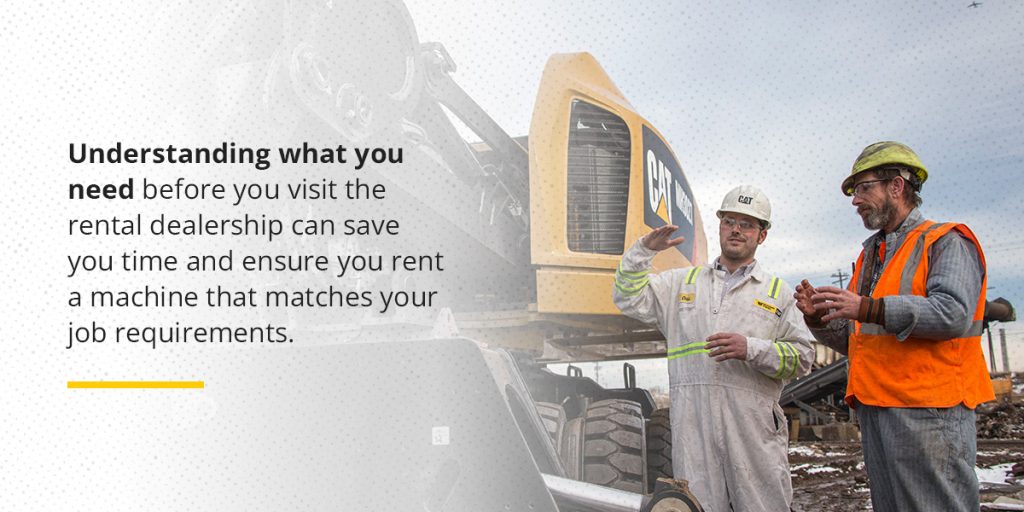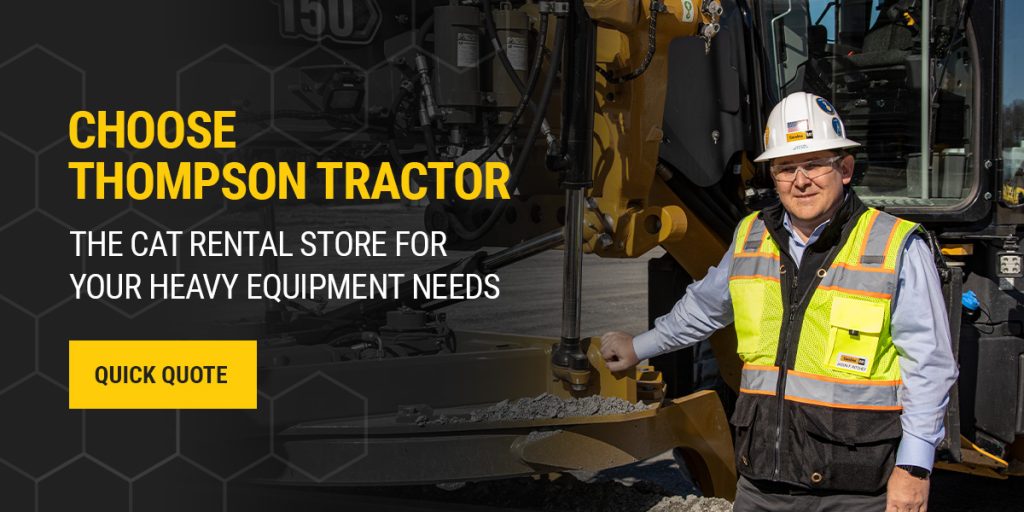
Knowing what to look for when renting equipment is key to getting the most out of your rental agreement. Continue reading our guide so you fully understand the ins and outs of heavy equipment rental and can get the job done right.
Why You Should Rent Heavy Equipment
Renting heavy equipment and machinery is an advantageous choice for many companies because it provides more flexibility than purchasing new or used equipment. The benefits of renting heavy equipment include:
- Boost productivity: Renting equipment provides the opportunity to access the latest equipment from leading manufacturers, allowing you to work with premium machines that increase the efficiency of your operations. You can also leverage multiple rentals to work on different projects simultaneously, enabling high productivity at each job site.
- Try before you buy: Many companies find that a hybrid fleet is helpful because it allows them to experiment with different pieces of equipment before making an investment. For example, if you’re considering upgrading to a newer model, renting different models can help you compare your options so you can feel more confident in your purchase.
- Expand your business: Take on jobs that are new to your company by renting equipment on a project-by-project basis. Once you finish the job, simply return the equipment and rent again when a similar job comes up. When more complex jobs come your way, you’ll have what you need to tackle them with confidence.
- Cut costs: When you buy new equipment, you spend money that could be applied to other projects, potentially leading to missed opportunities. Open your company up to new opportunities by renting heavy equipment.
Key Things to Consider With Heavy Equipment Rentals
Before you go to the dealership, you need a plan to get the most out of your rental equipment. Here’s what to consider when renting heavy equipment:
- Budget: Understanding how well a rental fits into your overall budget can help you determine whether it’s worth the cost. Put the estimated cost of renting the equipment into your project budget to see how it works.
- Frequency of use: If you only need a machine for a few projects, it’s far more profitable to rent that equipment than it would be to buy and store it. However, if you tend to work on similar projects more often, you may find it more advantageous to purchase the equipment.
- Project requirements: Make sure you know the specific requirements of each job for which you’ll use the rental equipment. Site conditions, scope, and necessary attachments or features are all important factors in deciding which machine will best suit your needs.
3 Tips for Renting Heavy Equipment Machines
If you need help navigating the heavy equipment rental landscape, we’ve got your back. The following tips will help you ensure a smooth rental process and a successful project:
1. Rent From a Company You Can Trust
Always make sure you rent from a reliable rental company. Read through online reviews and testimonials to get a better sense of the company and its services. If you’re unsure where to start, you can also ask around to find out who your competitors work with to rent their equipment.
Additionally, be sure to inspect equipment before signing the rental agreement. Check for rust, abnormal wear, leaks, and faded exteriors. If you notice any of these red flags, it’s best to go with another rental company.
2. Understand the Terms and Conditions
Make sure to thoroughly read the terms and conditions before you sign the rental contract. In particular, you need to understand what the company can hold you liable for and their policies on cancellation and rescheduling.
Familiarize yourself with all of the costs involved with renting equipment. In many cases, the estimated upfront rental cost will differ from the price you’ll end up paying due to additional fees. In addition to the upfront rental fee, fees can include:
- Transportation
- Fuel and fluids
- Work tools
- Labor
- Operator training, if applicable
If you’re having trouble finding information about fees and additional charges on a rental company’s website, contact them to ask for more information. If they seem hesitant to answer, you may want to work with a different company.
3. Know Your Needs
Understanding what you need before you visit the rental dealership can save you time and ensure you rent a machine that matches your job requirements. Consider the following:
- Project length: Determine a realistic estimate for how long you’ll need the equipment. Give yourself some buffer time when creating this timeline to account for potential work interruptions like inclement weather or operator absences.
- Job site conditions: Depending on your site’s conditions, you may need specialized machinery or features. Be sure to tell your dealer about the surface you’ll be working on and typical weather conditions and project scope to ensure you get the best match.
- Attachments or features: The features you’ll need will depend on your job requirements. For example, you’ll likely need a tooth-edged bucket for demolition work or a hammer for drilling jobs.
- Machine height: Make sure you know the heights you’ll need to reach for each job. Verify with your rental dealer that the machine you’re interested in will meet your minimum and maximum height requirements.
- Maximum load: Provide your rental coordinator with a rough estimate of the maximum weight you’ll need the machine to lift and the type of material you’ll be lifting.
If you need help making a decision, you can always ask the experts at your rental company for advice.
Questions to Ask When Renting Heavy Equipment
Asking questions during the process can help you narrow down your list of rental providers and pinpoint the right equipment for your project.
Here’s what you need to know before renting equipment:
- What are the company’s rates?
- Do they charge additional fees?
- What are typical pickup and delivery times?
- How often do they perform preventive maintenance on their equipment?
- What kind of support do they offer?
- What’s their selection like?
- Do they provide operator training?
- What’s their return policy?
- What are their hours like?
Why You Should Rent From Thompson Tractor — The Cat® Rental Store
As a leading rental company in Alabama and northwestern Florida, we strive to ensure your success. We carry a wide variety of rental equipment from Caterpillar and other premier heavy equipment brands.
Our rentals are always in work-ready condition, so you can rent from us with total confidence. We perform regular maintenance checks and inspections to identify and resolve mechanical issues that could impact performance and dependability.
Further, when you work with us, you get a flexible rental agreement that works for your business. Whether you rent on a daily, weekly or monthly basis, we can accommodate your needs.
Choose Thompson Tractor — The Cat Rental Store for Your Heavy Equipment Needs
Our team of knowledgeable, professional heavy equipment experts can help you find the right rental equipment for your project. Get started today by requesting a quick online quote, or click here to find your nearest location.
If you’d like more information about our rental process, feel free to call us at 205-664-9489. A rental specialist will be able to answer any questions and concerns you may have.



